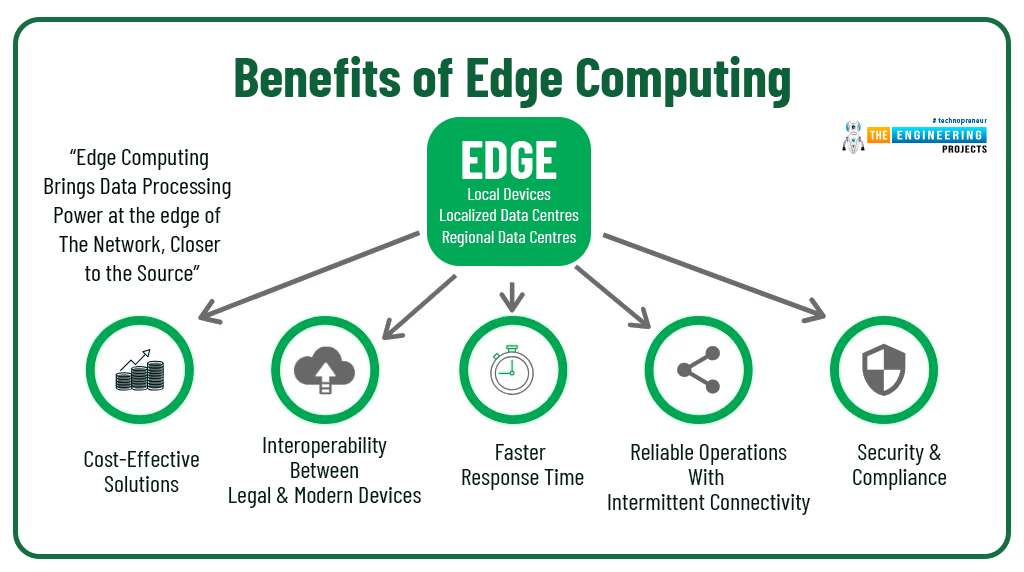Benefits of Edge Computing
Edge computing has emerged as a revolutionary concept in the field of technology, offering numerous benefits that can transform the way we process and analyze data. In this article, we will delve into the advantages of edge computing and explore how it can enhance efficiency, security, and scalability in various industries.
Improved Latency and Real-Time Processing
Edge computing brings computing resources closer to the data source, reducing latency and enabling real-time processing. By minimizing the distance data needs to travel, edge computing allows for faster response times and enhanced user experiences. Whether it’s autonomous vehicles, IoT devices, or critical healthcare applications, the ability to process data at the edge provides near-instantaneous results, ensuring prompt decision-making and improved overall performance.
Enhanced Data Privacy and Security
Data privacy and security are paramount concerns in today’s digital landscape. Edge computing addresses these concerns by keeping sensitive data localized and reducing the risk of data breaches. With edge computing, data is processed and analyzed at the edge devices themselves, minimizing the need for transmitting sensitive information to centralized servers. This decentralized approach significantly reduces the attack surface and enhances data privacy, making edge computing an ideal solution for industries dealing with sensitive information such as finance, healthcare, and government sectors.
Bandwidth Optimization
With the proliferation of data-intensive applications and the exponential growth of connected devices, network bandwidth has become a valuable resource. Edge computing helps optimize bandwidth usage by processing and filtering data at the edge devices before transmitting it to the cloud or data centers. By reducing the amount of data that needs to be transmitted, edge computing minimizes network congestion, lowers costs, and ensures efficient utilization of available resources.
Improved Reliability and Resilience
Edge computing offers improved reliability and resilience by reducing dependency on centralized infrastructure. In traditional cloud-based architectures, a single point of failure can disrupt an entire system. However, with edge computing, data processing and storage are distributed across multiple edge devices, ensuring redundancy and fault tolerance. This distributed approach enhances system reliability, reduces downtime, and enables uninterrupted operations even in the face of network disruptions or failures.
Scalability and Cost Efficiency
Scalability is a crucial factor for businesses dealing with rapidly growing data volumes. Edge computing provides a scalable solution by allowing organizations to distribute computational resources across edge devices as needed. This distributed architecture enables organizations to handle increasing workloads without overburdening centralized servers or data centers. Additionally, edge computing can lead to cost savings by reducing the need for expensive infrastructure upgrades and minimizing data transfer costs associated with cloud-based solutions.
Use Cases of Edge Computing
Edge computing finds applications in various industries, revolutionizing their operations and unlocking new possibilities. Some notable use cases include:
Autonomous Vehicles
Edge computing plays a vital role in autonomous vehicles by enabling real-time data processing for critical decision-making. By leveraging edge devices installed in vehicles, data can be processed locally, ensuring minimal latency and enhancing passenger safety.
Internet of Things (IoT)
The IoT ecosystem generates an enormous amount of data that requires real-time processing. Edge computing facilitates efficient data analysis at the edge devices, reducing the need for constant communication with the cloud and enabling faster response times for time-sensitive applications.
Healthcare
In the healthcare industry, edge computing can revolutionize patient monitoring, telemedicine, and emergency response systems. By processing and analyzing data at the edge, healthcare providers can ensure immediate actions, reduce response times, and improve patient outcomes.
Industrial Automation
Edge computing empowers industrial automation by enabling real-time analytics and decision-making at the edge devices. This enables faster response to changing conditions, improves operational efficiency, and enhances overall productivity.
Retail
Edge computing can enhance the retail industry by enabling personalized shopping experiences, real-time inventory management, and efficient supply chain operations. By processing data at the edge, retailers can provide tailored recommendations to customers and optimize their operations in real time.

Edge computing offers a multitude of benefits that can transform industries across the board. From improved latency and real-time processing to enhanced data privacy and security, edge computing presents a compelling solution for organizations seeking to optimize their operations in an increasingly data-driven world. By leveraging the advantages of edge computing, businesses can unlock new possibilities, improve efficiency, and gain a competitive edge in the modern digital landscape.
Frequently Asked Questions
1. What is edge computing?
Edge computing is a distributed computing paradigm that brings computation and data storage closer to the location where it is needed, reducing latency and improving performance.
2. How does edge computing benefit businesses?
Edge computing offers several benefits to businesses, including reduced latency, improved data security, enhanced scalability, and cost savings on bandwidth and cloud resources.
3. Can edge computing improve the performance of IoT devices?
Yes, edge computing can significantly improve the performance of IoT devices by processing data locally at the edge rather than sending it to a centralized cloud server. This reduces latency and enables real-time decision-making.
4. Does edge computing enhance data privacy?
Edge computing enhances data privacy by keeping sensitive data closer to its source and reducing the need to transmit it over networks. This reduces the risk of data breaches and ensures compliance with privacy regulations.
5. How does edge computing help in reducing network congestion?
Edge computing offloads processing tasks from the central cloud to edge devices, reducing the amount of data that needs to be transmitted over the network. This helps in reducing network congestion and optimizing bandwidth usage.
6. Can edge computing improve the reliability of applications?
Yes, edge computing can improve the reliability of applications by enabling them to function even when there is a loss of connectivity to the central cloud. Local processing at the edge ensures uninterrupted operation and reduces the impact of network outages.
7. Does edge computing support real-time analytics?
Yes, edge computing supports real-time analytics by processing data locally at the edge, enabling immediate insights and faster decision-making. This is especially beneficial for time-sensitive applications and industries like autonomous vehicles and healthcare.
8. How does edge computing contribute to cost savings?
Edge computing reduces the need for extensive data transfers to the cloud, resulting in cost savings on bandwidth and cloud resources. It also eliminates the need for constant internet connectivity, reducing operational costs.
9. Can edge computing improve the efficiency of AI applications?
Yes, edge computing can improve the efficiency of AI applications by performing local processing and inference at the edge. This reduces latency, enhances response times, and enables AI applications to function in real-time without relying solely on cloud resources.
10. Is edge computing suitable for all types of applications?
While edge computing offers numerous benefits, it may not be suitable for all types of applications. Applications that require massive data processing or rely heavily on cloud-based resources may still benefit more from centralized cloud computing.




